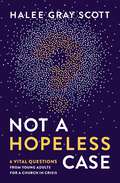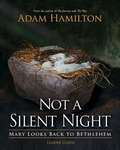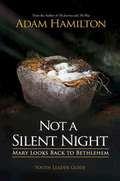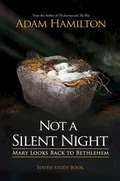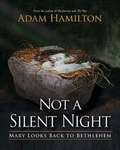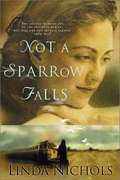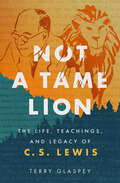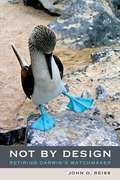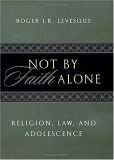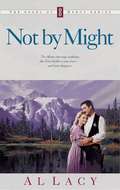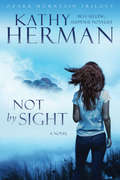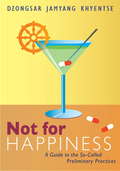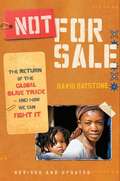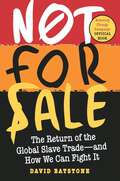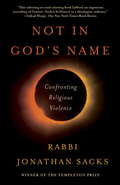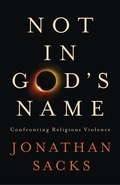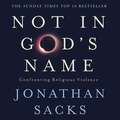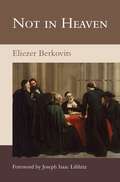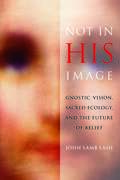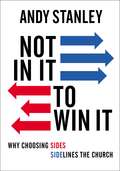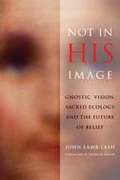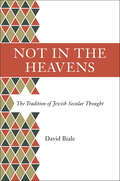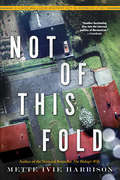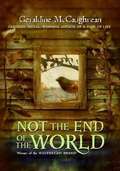- Table View
- List View
Not a Hopeless Case: 6 Vital Questions from Young Adults for a Church in Crisis
by Halee Gray ScottIs America the next missionary graveyard? Or is it ripe for spiritual revolution? The statistics seem grim. Every year, the decline of Christianity continues at a rapid pace, especially among young adults. Churches across the country are closing their doors, dying, or are being "adopted" by nearby larger churches. What is the story church leaders hear? We've lost the next generation.But this decline in religious affiliation has not made us less spiritual. Young adults are still asking questions that only faith (or religion) can fully answer. Questions are like seeds buried in the rich, dark soil of our hearts. Nurtured with oxygen and water, they unfold into that which they were meant to become. Absent these conditions, they wither in the dark. Those most resistant to Christianity are those whose questions did not receive oxygen in their faith communities while they were children and teenagers.Not a Hopeless Case is the story of questions, the questions of young adults about faith and spirituality--young adults who are lost and want to be found--and the questions of pastors who seek to find them.
Not a Silent Night Leader Guide: Mary Looks Back to Bethlehem (Not a Silent Night Advent series)
by Adam HamiltonImagine Jesus from Mary’s point-of-view—proud of her son, in awe of his gifts and mission, guided by love for him as a person and so much more. Adam Hamilton begins at the end, with Mary at the crucifixion and resurrection; travels back in time as she witnesses his life and ministry; and ends at the beginning, with the Christ child born in a stable, Mary’s beautiful baby. This year, experience Advent and Christmas with Mary.This leader guide is designed for group use, along with Adam Hamilton’s book and DVDNot a Silent Night: Mary Looks Back to Bethlehem. The leader guide includes everything a group leader needs to facilitate sessions and tailor them to the time and style of each group. The five sessions are based on the book and DVD topics: 1. Beginning with the End 2. The Piercing of Mary’s Soul 3. Amazed, Astounded, and Astonished 4. Mary, Full of Grace 5. It Was Not a Silent Night
Not a Silent Night Youth Leader Guide: Mary Looks Back to Bethlehem (Not a Silent Night Advent series)
by Adam HamiltonImagine Jesus from Mary’s point of view—proud of her son, in awe of his gifts and mission, guided by love for him as a person and so much more. In this book, Adam Hamilton begins at the end, with Mary at the crucifixion and resurrection; travels back in time as she witnesses his life and ministry; and ends at the beginning, with the Christ child born in a stable, Mary’s beautiful baby. This year, experience Advent and Christmas with Mary. Contains everything needed to conduct a five-session study geared to youth, including current examples that have meaning to young people ages 13-18. In addition to leader helps, the Youth Study Book is included with this guide, so leaders can follow along as group members read and study. Can be used with the adult-level DVD.
Not a Silent Night Youth Study Book: Mary Looks Back to Bethlehem (Not a Silent Night Advent series)
by Adam HamiltonThis five-session study for Advent highlights the experiences of Mary,Jesus’ mother, by looking at key moments from Jesus’ life and ministryfrom her perspective. Readings from Scripture; devotional essays; artfor reflection; craft suggestions and recipes; and dramatic monologuesimagining Mary's thoughts and feelings all give youth the opportunityfor prayerful contemplation in the midst of the busy holiday season.
Not a Silent Night: Mary Looks Back to Bethlehem (Not a Silent Night Advent series)
by Adam HamiltonImagine Jesus from Mary’s point of view—proud of her son, in awe of his gifts and mission, guided by love for him as a person and so much more. In this book, Adam Hamilton begins at the end, with Mary at the crucifixion and resurrection; travels back in time as she witnesses his life and ministry; and ends at the beginning, with the Christ child born in a stable, Mary’s beautiful baby. This year, experience Advent and Christmas with Mary. The five sessions are:1. Beginning with the End 2. The Piercing of Mary’s Soul 3. Amazed, Astounded, and Astonished 4. Mary, Full of Grace 5. It Was Not a Silent Night
Not a Sparrow Falls
by Linda NicholsA young woman from the hills of Virginia flees the men who have lured her away from a godly upbringing into a life of desperation hopes to bring help to a troubled family. Taking on a new identity, Mary Bridget Washburn escapes to the bustling city of Alexandria. There her path crosses that of Alasdair MacPherson, a widowed pastor with three young children and daunting problems of his own. She longs to bring happiness to the deeply troubled family, but seems an unlikely candidate to help. Has she fallen too far from grace to be able to pass it on?
Not a Tame Lion: The Life, Teachings, and Legacy of C.S. Lewis
by Terry GlaspeyFinalist for the best biography of the year with Christian Book Awards.The life, thought, and legacy of C. S. Lewis—a Prophet for our TimesOne of the most brilliant minds of the twentieth century, C. S. Lewis bridged literature, philosophy, and religion. He taught at Oxford and Cambridge, all the while communicating in a clear, winsome manner that ordinary men and women could comprehend. He gave us masterpieces like The Screwtape Letters, The Chronicles of Narnia, Mere Christianity, The Problem of Pain, and still more. In this fascinating biographical study Not a Tame Lion, author Terry Glaspey points out that Lewis&’ life was as compelling as his work. Glaspey gives readers a glimpse of the character of this extraordinarily gifted man—who believed that his sharp mind and rich imagination were to be accompanied by a sense of responsibility to the wider world. If Lewis were alive today, he would see the fruition of trends he warned against many years ago. His continued relevance is based on his understanding of the human predicament—a predicament that is intellectual and moral, as well as spiritual. Lewis points the way out of this predicament, but it&’s not an easy way. It requires submission to God's authority, moral discipline, and integrity of action. Lewis shows how our lives can be lived in light of eternity and can demonstrate the hope that endures, even in these shadowlands.
Not by Design: Retiring Darwin's Watchmaker
by John O. ReissThe author tries to show that the concept of natural selection is often invoked to explain evolutionary transformations for which we have no evidence that the mechanism of natural selection, as currently understood, was wholly or even partially responsible for the transformation.
Not by Faith Alone: Religion, Law, and Adolescence
by Roger J.R. LevesqueTeens are often seen as challenging social mores. They are frequently perceived to engage in activities considered by adults to be immoral, including sexual behavior, delinquent activities, and low-level forms of violence. Yet the vast majority report surprisingly high levels of religiosity. Ninety-five percent of American teens aged 13-17 believe in God or a universal spirit, and 76% believe that God observes their actions and rewards or punishes them. Nearly half engage in religious practices, such as praying alone or attending church or synagogue services. Adolescents' religious beliefs are clearly important to them. Yet, the law does not know how to approach adolescents' religious rights and needs. In Not by Faith Alone, Roger J. R. Levesque argues that teens' search for meaning does not always serve adolescents or society well. Religious doctrines and institutions are not all "good," with violence linked to religious beliefs, for example—particularly racial/ethnic and sexual orientation harassment—becoming an increasing concern. Not by Faith Alone is the first attempt to integrate research on the place of religion in adolescent development and to discuss the relevance of that research for policies and laws which regulate religion in their lives. Levesque asks how religion, broadly defined, influences the development of teens' inner moral compasses, and how we can ensure that religion and the apparent need for "religious" activity lead to positive outcomes for individual adolescents and for society.
Not by Might (Angel of Mercy Series #8)
by Al LacyNurse Natalie Fallon has brought her ailing mother to Denver for her health and starts a job at Denver's Mile High Hospital, where she meets fellow nurse Breanna Baylor Brockman. In Natalie's past is a relationship with Rex Rawlins, a young medical student. Two years prior she had ended the relationship when she learned Rex was planning a rural practice. She is determined not to marry a country doctor like her father, who died at age 43 from overwork. But she has never stopped loving Rex, and now, little does she know that Rex is a rural doctor in the surrounding mountains. A serious accident brings them together, but it will take a miracle to give them the promise of a life together.
Not by Sight: A Novel (Ozark Mountain Trilogy #1)
by Kathy HermanHer Sister Couldn't Be Alive ... Could She? It had to be Riley Jo. She was certain. . .wasn't she? But when Abby Cummings tells her mother she thought she saw her sister at the store, her mother quickly dismisses the idea. After all, Riley Jo and their father had been missing for years. Presumably dead. Yet Abby cannot ignore her intuition. Telling her friend J. D., they investigate. But J. D. may know more about the disappearance than he's telling, or even realizes. And as they work to uncover what happened, all they have to go on is blind faith. Will it be enough. . .especially considering what the truth might be?
Not for Happiness: A Guide to the So-Called Preliminary Practices
by Dzongsar Jamyang KhyentseDo you practise meditation because you want to feel good? Or to help you relax and be "happy"? Then frankly, according to Dzongsar Jamyang Khyentse, you are far better off having a full-body massage than trying to practise the Dharma. Genuine spiritual practice, not least the Ngöndro preliminaries, will not bring the kind of comfort and ease most worldly people crave. Quite the opposite, in fact. But if your ultimate goal is enlightenment, Ngöndro practice is a must, and Not for Happiness your perfect guide, as it contains everything an aspiring practitioner needs to get started, including advice about: * developing "renunciation mind" * discipline, meditation and wisdom * using your imagination in visualization practice * why you need a guru
Not for Sale
by David BatstoneHuman trafficking generates $32 billion annually and enslaves over 30 million people, half of them children. Award-winning journalist David Batstone, whom Bono calls "a heroic character," profiles the new generation of abolitionists who are leading the movement. This groundbreaking global report is now updated with the latest findings, new stories, and statistics that highlight what is being done to end this appalling epidemic--and how you can join the movement.
Not for Sale: The Return of the Global Slave Trade—and How We Can Fight It
by David Batstone“Human trafficking is not an issue of the left or right, blue states or red states, but a great moral tragedy we can unite to stop . . . Not for Sale is a must-read to see how you can join the fight.” —Jim Wallis, author of God's Politics“David Batstone is a heroic character.” —BonoIn the revised and updated version of this harrowing yet deeply inspirational exposé, award-winning journalist David Batstone gives the most up-to-date information available on the $31 billion human trafficking epidemic. With profiles of twenty-first century abolitionists like Thailand’s Kru Nam and Peru’s Lucy Borja, Batstone tells readers what they can do to stop the modern slave trade. Like Kevin Bales’ Disposable People and Ending Slavery, or E. Benjamin Skinner’s A Crime So Monstrous, Batstone’s Not for Sale is an informative and necessary manifesto for universal freedom.
Not in God's Name
by Jonathan SacksIn this powerful and timely book, one of the most admired and authoritative religious leaders of our time tackles the phenomenon of religious extremism and violence committed in the name of God. If religion is perceived as being part of the problem, Rabbi Sacks argues, then it must also form part of the solution. When religion becomes a zero-sum conceit--that is, my religion is the only right path to God, therefore your religion is by definition wrong--and individuals are motivated by what Rabbi Sacks calls "altruistic evil," violence between peoples of different beliefs appears to be the only natural outcome. But through an exploration of the roots of violence and its relationship to religion, and employing groundbreaking biblical analysis and interpretation, Rabbi Sacks shows that religiously inspired violence has as its source misreadings of biblical texts at the heart of all three Abrahamic faiths. By looking anew at the book of Genesis, with its foundational stories of Judaism, Christianity, and Islam, Rabbi Sacks offers a radical rereading of many of the Bible's seminal stories of sibling rivalry: Cain and Abel, Isaac and Ishmael, Jacob and Esau, Joseph and his brothers, Rachel and Leah. "Abraham himself," writes Rabbi Sacks, "sought to be a blessing to others regardless of their faith. That idea, ignored for many of the intervening centuries, remains the simplest definition of Abrahamic faith. It is not our task to conquer or convert the world or enforce uniformity of belief. It is our task to be a blessing to the world. The use of religion for political ends is not righteousness but idolatry . . . To invoke God to justify violence against the innocent is not an act of sanctity but of sacrilege." Here is an eloquent call for people of goodwill from all faiths and none to stand together, confront the religious extremism that threatens to destroy us, and declare: Not in God's Name.From the Hardcover edition. of the Abrahamic monotheisms--passages that, when interpreted literally, can lead to hatred, violence, and war--is an eloquent, clarion call for people of goodwill from all faiths to join together to end the misunderstandings that threaten to destroy us all.
Not in God's Name: Confronting Religious Violence
by Jonathan Sacks***2015 National Jewish Book Award Winner***In this powerful and timely book, one of the most admired and authoritative religious leaders of our time tackles the phenomenon of religious extremism and violence committed in the name of God. If religion is perceived as being part of the problem, Rabbi Sacks argues, then it must also form part of the solution. When religion becomes a zero-sum conceit—that is, my religion is the only right path to God, therefore your religion is by definition wrong—and individuals are motivated by what Rabbi Sacks calls “altruistic evil,” violence between peoples of different beliefs appears to be the only natural outcome. But through an exploration of the roots of violence and its relationship to religion, and employing groundbreaking biblical analysis and interpretation, Rabbi Sacks shows that religiously inspired violence has as its source misreadings of biblical texts at the heart of all three Abrahamic faiths. By looking anew at the book of Genesis, with its foundational stories of Judaism, Christianity, and Islam, Rabbi Sacks offers a radical rereading of many of the Bible’s seminal stories of sibling rivalry: Cain and Abel, Isaac and Ishmael, Jacob and Esau, Joseph and his brothers, Rachel and Leah. “Abraham himself,” writes Rabbi Sacks, “sought to be a blessing to others regardless of their faith. That idea, ignored for many of the intervening centuries, remains the simplest definition of Abrahamic faith. It is not our task to conquer or convert the world or enforce uniformity of belief. It is our task to be a blessing to the world. The use of religion for political ends is not righteousness but idolatry . . . To invoke God to justify violence against the innocent is not an act of sanctity but of sacrilege.” Here is an eloquent call for people of goodwill from all faiths and none to stand together, confront the religious extremism that threatens to destroy us, and declare: Not in God’s Name.From the Hardcover edition.
Not in God's Name: Confronting Religious Violence
by Jonathan SacksDespite predictions of continuing secularisation, the twenty-first century has witnessed a surge of religious extremism and violence in the name of God.In this powerful and timely book, Jonathan Sacks explores the roots of violence and its relationship to religion, focusing on the historic tensions between the three Abrahamic faiths: Judaism, Christianity and Islam.Drawing on arguments from evolutionary psychology, game theory, history, philosophy, ethics and theology, Sacks shows how a tendency to violence can subvert even the most compassionate of religions. Through a close reading of key biblical texts at the heart of the Abrahamic faiths, Sacks then challenges those who claim that religion is intrinsically a cause of violence, and argues that theology must become part of the solution if it is not to remain at the heart of the problem.This book is a rebuke to all those who kill in the name of the God of life, wage war in the name of the God of peace, hate in the name of the God of love, and practise cruelty in the name of the God of compassion.For the sake of humanity and the free world, the time has come for people of all faiths and none to stand together and declare: Not In God's Name.
Not in God's Name: Confronting Religious Violence
by Jonathan SacksDespite predictions of continuing secularisation, the twenty-first century has witnessed a surge of religious extremism and violence in the name of God.In this powerful and timely book, Jonathan Sacks explores the roots of violence and its relationship to religion, focusing on the historic tensions between the three Abrahamic faiths: Judaism, Christianity and Islam.Drawing on arguments from evolutionary psychology, game theory, history, philosophy, ethics and theology, Sacks shows how a tendency to violence can subvert even the most compassionate of religions. Through a close reading of key biblical texts at the heart of the Abrahamic faiths, Sacks then challenges those who claim that religion is intrinsically a cause of violence, and argues that theology must become part of the solution if it is not to remain at the heart of the problem.This book is a rebuke to all those who kill in the name of the God of life, wage war in the name of the God of peace, hate in the name of the God of love, and practise cruelty in the name of the God of compassion.For the sake of humanity and the free world, the time has come for people of all faiths and none to stand together and declare: Not In God's Name.(P)2016 Hodder & Stoughton
Not in Heaven: The Nature and Function of Jewish Law
by Eliezer BerkovitsIn this classic work, Rabbi Eliezer Berkovits analyzes Jewish law as it applies to the religious, ethical, and judicial principles of Judaism in the ever-changing human situation. Delineating common sense, feasibility, and ethical concern as the underpinnings of the Jewish legal system, Berkovits provides a wealth of original insights into the very essence of halacha.
Not in His Image: Gnostic Vision, Sacred Ecology, and the Future of Belief
by Derrick Jensen John Lamb LashBasing much of Not in His Image on the Nag Hammadi and other Gnostic writings, John Lamb Lash explains how a little-known messianic sect propelled itself into a dominant world power, systematically wiping out the great Gnostic spiritual teachers, the Druid priests, and the shamanistic healers of Europe and North Africa. They burned libraries and destroyed temples in an attempt to silence the ancient truth-tellers and keep their own secrets. But as Lash reveals, when the truth is the planet Earth it cannot be hidden or destroyed. Not in His Image delves deeply into the shadows of ancient Gnostic writings to reconstruct the story early Christians tried to scrub from the pages of history, exploring the richness of the ancient European Pagan spirituality--the Pagan Mysteries, the Great Goddess, Gnosis, the myths of Sophia and Gaia--and chronicles the annihilation of this Pagan European culture at the hands of Christianity. Long before the birth of Christianity, monotheism was an anomaly; Europe and the Near East flourished under the divine guidance of Sophia, the ancient goddess of wisdom. The Earth was the embodiment of Sophia and thus sacred to the people who sought fulfillment in her presence. This ancient philosophy was threatening to the emerging salvation-based creed of Christianity that was based on patriarchal dominion over the Earth and lauded personal suffering as a path to the afterlife. As Derrick Jensen points out in the afterword, in Lash's hands Jesus Christ emerges as the agent provocateur of the ruling classes.
Not in It to Win It: Why Choosing Sides Sidelines The Church
by Andy StanleyIs it possible to disagree politically and love unconditionally? The reaction of evangelicals to political and cultural shifts in recent years revealed what they value most. Lurking beneath our Bible-laced rhetoric, faith claims, books, and sermons is a relentless drive to WIN!But the church is not here to win. By every human measure, our Savior lost. On purpose. With a purpose. And we are his body. We are not in it to win anything. We are in it for something else entirely. That something else is what this book is about.You'll discover:How to take a stand the right way. You'll learn how to make your case with a posture of humility and understanding, rather than being fueled by the fear of losing something.How to view politics through the lens of faith. Learn curiously, listen intentionally, and love unconditionally.How the life of Jesus and his teaching applies to modern-day challenges in a fresh way. The "biblical" stand may not be what we've been taught.Jesus never asked his followers to agree on everything. But he did call his followers to obey a new command: to love others in the same way he has loved us. Instead of asserting our rights or fighting for power, we need to begin asking ourselves: what does love require of me?
Not in his Image: Gnostic Vision, Sacred Ecology, and the Future of Belief
by John Lamb LashBasing much of Not in His Image on the Nag Hammadi and other Gnostic writings, John Lamb Lash explains how a little-known messianic sect propelled itself into a dominant world power, systematically wiping out the great Gnostic spiritual teachers, the Druid priests, and the shamanistic healers of Europe and North Africa. They burned libraries and destroyed temples in an attempt to silence the ancient truth-tellers and keep their own secrets. But as Lash reveals, when the truth is the planet Earth it cannot be hidden or destroyed. Not in His Image delves deeply into the shadows of ancient Gnostic writings to reconstruct the story early Christians tried to scrub from the pages of history, exploring the richness of the ancient European Pagan spirituality-the Pagan Mysteries, the Great Goddess, Gnosis, the myths of Sophia and Gaia-and chronicles the annihilation of this Pagan European culture at the hands of Christianity. Long before the birth of Christianity, monotheism was an anomaly; Europe and the Near East flourished under the divine guidance of Sophia, the ancient goddess of wisdom. The Earth was the embodiment of Sophia and thus sacred to the people who sought fulfillment in her presence. This ancient philosophy was threatening to the emerging salvation-based creed of Christianity that was based on patriarchal dominion over the Earth and lauded personal suffering as a path to the afterlife. As Derrick Jensen points out in the afterword, in Lash's hands Jesus Christ emerges as the agent provocateur of the ruling classes.
Not in the Heavens: The Tradition of Jewish Secular Thought
by David BialeThe story of the origins and development of a Jewish form of secularismNot in the Heavens traces the rise of Jewish secularism through the visionary writers and thinkers who led its development. Spanning the rich history of Judaism from the Bible to today, David Biale shows how the secular tradition these visionaries created is a uniquely Jewish one, and how the emergence of Jewish secularism was not merely a response to modernity but arose from forces long at play within Judaism itself.Biale explores how ancient Hebrew books like Job, Song of Songs, and Esther downplay or even exclude God altogether, and how Spinoza, inspired by medieval Jewish philosophy, recast the biblical God in the role of nature and stripped the Torah of its revelatory status to instead read scripture as a historical and cultural text. Biale examines the influential Jewish thinkers who followed in Spinoza's secularizing footsteps, such as Salomon Maimon, Heinrich Heine, Sigmund Freud, and Albert Einstein. He tells the stories of those who also took their cues from medieval Jewish mysticism in their revolts against tradition, including Hayim Nahman Bialik, Gershom Scholem, and Franz Kafka. And he looks at Zionists like David Ben-Gurion and other secular political thinkers who recast Israel and the Bible in modern terms of race, nationalism, and the state.Not in the Heavens demonstrates how these many Jewish paths to secularism were dependent, in complex and paradoxical ways, on the very religious traditions they were rejecting, and examines the legacy and meaning of Jewish secularism today.
Not of This Fold (A Linda Wallheim Mystery #4)
by Mette Ivie HarrisonThe fourth installment in Mette Ivie Harrison's nationally bestselling Linda Wallheim mystery series, set in Mormon Utah, explores the effects of alienation, immigration, and extortion from the inner workings of the Mormon church. <P><P>Now that all five of her sons have left home, Mormon bishop’s wife Linda Wallheim has quite a bit of time on her hands, most of which she spends worrying about the state of the country and how her youngest son, Samuel, who is openly gay, is faring on his mission in Boston. She has also become close with one of the women in her ward, Gwen Ferris. <P><P>But Gwen is quickly losing faith in the church, and her issues with the Mormon power structure are only reinforced by her work in Draper’s local “Spanish ward.” The ward’s members comprise both legal and undocumented immigrants who aren’t always getting the community support they should be from their church. <P><P>When Gabriela Gonzalez, a young mother and Gwen’s friend in the Spanish Ward, is found strangled at a gas station, Gwen is paralyzed with guilt. The dead woman’s last phone call was to Gwen, and her voice mail reveals that she knew she was in danger. <P><P>When Gwen decides the police aren’t doing enough to get justice for Gabriela, who was undocumented, she decides to find the killer herself. Linda reluctantly takes part in Gwen’s vigilante sleuthing, fearing for her young friend’s safety, but what the pair discovers may put them both in danger.
Not the End of the World
by Geraldine MccaughreanNoah's daughter, daughters-in-law, sons, wife, and the animals describe what it was like to be aboard the ark while they watched everyone around them drown.
